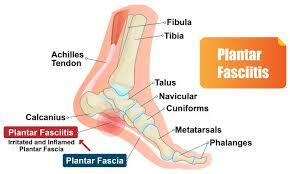Is Heel Pain A Sign Of Cancer: A Comprehensive Guideline
Outline of the Article:
-
- Introduction
- Why understanding heel pain is crucial
- Can heel pain be an early sign of cancer?
- Introduction
- The Basics of Heel Pain
-
-
- Common causes and conditions
- When heel pain becomes a concern
- Types of Cancer Linked to Heel Pain
- Bone cancer
- Soft towel sarcoma
- Cancer that has spread.
-
- Heel Discomfort and Osseous Malignancy
-
-
- Symptoms of bone cancer in the heel
- Types of bone cancer Affecting the foot
-
- Soft Towel Sarcoma and Heel Pain
-
-
- Overview of soft towel sarcoma
- Why it may affect the heel
- Cancer that has spread and Pain in the Heel
- How cancer spreads to bones
- Common cancers metastasizing to the heel
-
- Key Symptoms of Cancer- Related Heel Pain
-
-
- Distinguishing features of pain
- Associated signs and systemic symptoms
- When to Worry About Heel Pain
- Red flags indicating serious issues
- The importance of early medical attention
-
- Diagnosing Heel Pain
-
-
- Imaging ways(X-rays, MRI, CT reviews)
- Biopsy and pathology tests
- Blood tests and cancer markers
-
- Treatment Options for Cancer-Related Heel Pain
-
-
- Surgery for tumors
- Chemotherapy and radiation remedy
- Palliative care and pain operation
-
- Difference Table Cancer- Related Heel Pain vs.Non-Cancerous Heel Pain
-
-
- Non-Cancerous Reasons for Heel Discomfort
- Heel spurs
- Tendinitis
-
- Efficient Home Treatments for Heel Pain Relief
-
-
- Rest, ice, and compression
- Stretching and physical therapy
- Pain management with medications
-
- Avoiding Heel Discomfort
-
-
- Lifestyle adjustments
- Importance of footwear and posture
- Reducing overuse injuries
-
- Coping with Chronic Heel Pain
-
-
- Mental health considerations
- Support resources and lifestyle changes
-
- The Psychological Impact of Heel Pain
-
-
- Addressing anxiety and fear
- Finding professional and community support
-
- Myths and Data About Cancer and Heel Pain
-
- Dispelling common misconceptions
- Recognizing accurate signs of cancer-related pain
- Conclusion
- Summary of key points
- Final advice for those experiencing persistent heel pain
- FAQs
Is Heel Pain a Subscribe of Cancer?
Introduction
Is heel pain a sign of cancer is a common complaint, affecting people of all periods and cultures. While it’s generally attributed to conditions like tendinitis, it can sometimes gesture commodity more seriously. Is heel pain a sign of cancer Although rare, certain cancers can manifest as patient pain in the heel. Understanding when to be concerned is pivotal for early opinion and effective treatment.
The Basics of Heel Pain
utmost cases of heel pain are linked to overuse, indecorous footwear, or injuries. Similar conditions like heels are often the main causes of the pain. However, pain that continues temporary treatment, is identified over time, or occurs with another scenario may require additional investigation.
Types of Cancer Linked to Heel Pain
Bone Cancer
Bone tumors can cause heel pain if the cancer affects the bones in that area that is suffering from pain.
Soft Towel Sarcoma
Sarcomas that develop in the muscles, fat, or connective napkins near the bottom can manifest as heel pain.
Cancer that has spread and Pain in the Heel
Cancers that affect our lungs, Inner body parts, and bone can spread to the bones, such as the heel, leading to pain and unease.
Discomfort in the Heel and Bone Cancer
Bone cancer in the bottom is uncommon but can present as severe, patient pain in the heel. This pain is frequently deep and doesn’t ameliorate with rest. Lump, tenderheartedness, or a visible lump may accompany the pain.
Soft Towel Sarcoma and Heel Pain
Soft towel sarcomas can grow unnoticed until they press on jitters or bones, causing localized pain in the heel. These excrescences are rare but may present with swelling, tenderheartedness, and limited bottom mobility.
Metastatic Carcinoma and Heel Pain
Metastatic Carcinoma can spread from primary spots like the bone or prostate to the bones, including those in the heel. This process weakens the bone, potentially causing fractures, swelling, and patient discomfort. Fresh symptoms, similar to fatigue and unexplained weight loss, frequently accompany this type of pain.
Crucial Symptoms of Related Heel Pain
Pain Characteristics
- Persistent and deep pain
- Worsens at night or during inactivity
- Not relieved by typical remedies
Associated Symptoms
- Swelling or visible lumps
- Fatigue, weight loss, and fever
- Limited mobility in the foot
When to Worry About Heel Pain
Certain red flags indicate that heel pain requires immediate medical attention:
- Pain that persists for weeks or worsens over time
- Swelling, lumps, or changes in skin texture
- Systemic symptoms like fever or unexplained fatigue
Diagnosing Heel Pain
Imaging Tests
- X-rays: Identify bone abnormalities.
- MRI and CT: reviews give detailed views of soft napkins and bones.
Biopsy
Towel samples are taken to confirm the presence of cancerous cells.
Blood Tests
Specific markers can help identify certain cancers.
Treatment Options for Cancer-Related Heel Pain
Surgical Procedures
Surgery may involve removing tumors or affected areas of the heel.
Chemotherapy and Radiation
These curatives target and destroy cancer cells while easing symptoms.
Palliative Care
concentrated on perfecting the case’s quality of life, palliative care includes pain operation and cerebral support.
Difference Table Cancer- Related Heel Pain vs.Non-Cancerous Heel Pain
| Feature | Cancer-Related Heel Pain | Non-Cancerous Heel Pain |
| Pain Pattern | Persistent, worsens at night | Relieved with rest or treatment |
| Swelling or Lump | Often present | Rare or mild |
| Systemic Symptoms | Fatigue, weight loss, fever | Typically absent |
| Duration | Long-lasting, resistant to home remedies | Improves within days or weeks |
| Response to Treatment | Minimal response to conventional therapies | Positive response to rest and physical care |
Non-Cancer-Related Reasons for Heel Discomfort
Plantar Fasciitis
Inflammation of the towel connecting the heel to the toes, causes sharp pain, especially in the morning.
Heel Spurs
Bony growths on the heel bone can irritate girding napkins.
Tendinitis
Swelling is often caused by overexertion or improper shoes that we wear.
Efficient Home Solutions for Alleviating Heel Discomfort
Rest and Ice: Reduce inflammation with regular icing and elevation.
Stretching Exercises: Target the shin muscles and plantar fascia.
Pain specifics: Over-the-counter anti-inflammatories like ibuprofen can give relief.
Precluding Heel Pain
Choose the Right Footwear
Probative shoes with bumper can reduce strain on the bases.
Maintain a Healthy Weight
Excess weight puts additional pressure on the heels.
Avoid Overuse
Incorporate rest days into your exercise routine to help overuse injuries.
Managing with habitual Heel Pain
Chronic pain requires a multifaceted approach, including physical remedy, life adaptations, and professional medical care. Orthotic inserts and low-impact exercises can also help.
The Cerebral Impact of Heel Pain
Living with patient heel pain can beget stress and anxiety. Seek comfort or join support groups to partake in gests and find managing mechanisms.
Myths and Data About Cancer and Heel Pain
| Myth | Fact |
| “Heel pain is always a sign of cancer.” | Most heel pain cases are non-cancerous. |
| “Cancer-related heel pain appears suddenly.” | It usually develops gradually over time. |
| “Only older adults experience cancer-related pain.” | It can affect people of all ages, though rare. |
Conclusion
Heel pain is generally a benign and treatable condition. Still, patient or worsening pain, especially when accompanied by systemic symptoms, shouldn’t be ignored. Beforehand opinion can significantly ameliorate issues, particularly when serious causes like cancer are involved.
FAQs
- How rare is cancer-related heel pain?
Cancer-related heel pain is extremely rare and generally occurs as a result of metastatic complaints or primary cancers like bone or soft towel sarcoma. - Can pitch pain be the first sign of cancer?
While uncommon, heel pain may be an early symptom of certain cancers. Patient pain should be estimated by a croaker.
- How is cancer-related heel pain treated?
Options for treatment that are provided are surgery, chemotherapy, radiation, and good care, which vary based on the cancer type and its stage. - Are there other serious conditions causing heel pain?
Yes, conditions like infections, severe fractures, or autoimmune conditions can also beget patient heel pain. - What tests are used to diagnose cancer-related heel pain?
Croakers may use X-rays, MRIs, necropsies, and blood tests to identify cancer as the cause of heel pain.





